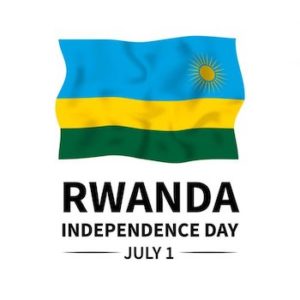
*Rwanda gained independence from Belgium on this date in 1962. Separated from Burundi, the episode is commemorated as Independence Day, a national holiday.
This came after decades of colonial strife following the Berlin Conference of 1884. Modern human settlement in what is now Rwanda dates back to at least the last glacial period, either the Neolithic period around 8000 BC or the long humid period that followed, lasting up to around 3000 BC. Archaeological excavations have revealed evidence of sparse settlement by hunter-gatherers in the late Stone Age, followed by a larger population of early Iron Age settlers who produced dimpled pottery and iron tools.
These early inhabitants were the ancestors of the Twa, aboriginal pygmy hunter-gatherers who remain in Rwanda today. Several Bantu groups migrated to Rwanda between 700 BC and 1500 AD, clearing forest land for agriculture. The forest-dwelling Twa lost much of their habitat and moved to the mountain slopes. Historians have several theories regarding the nature of the Bantu migrations. One theory suggests that the first settlers were Hutu, while the Tutsi migrated later to form a distinct racial group, possibly of Nilo-Hamitic origin. An alternative theory is that the migration was slow and steady, with incoming groups integrating rather than conquering the existing society.
Under this theory, the Hutu-Tutsi distinction arose later and was a class distinction rather than a racial one. The Republic of Rwanda is landlocked in the Great Rift Valley, where the African Great Lakes region and East Africa converge. Located a few degrees south of the Equator, Rwanda is bordered by Uganda, Tanzania, Burundi, and the Democratic Republic of the Congo. It is highly elevated, earning it the sobriquet "Land of a thousand hills," with its geography dominated by mountains in the west and savanna to the east, with numerous lakes throughout the country.
The climate is temperate to subtropical, with two distinct rainy and two dry seasons each year. Rwanda's population increased from 1.6 million people in 1934 to 7.1 million in 1989, resulting in increased competition for land. Rwanda has a population of over 12.6 million, living on 10,169 square miles of land, and is the most densely populated mainland African country. Because of the Rwanda Murders of 1994, the government has the youngest population on the continent, averaging 19 years of age. Approximately one million people reside in the capital and largest city, Kigali.